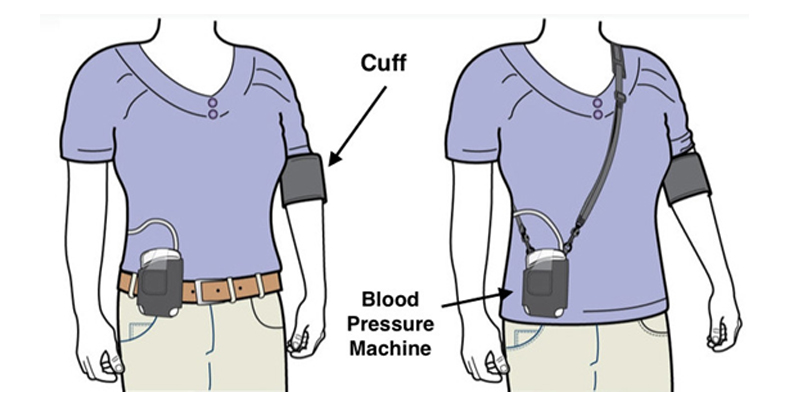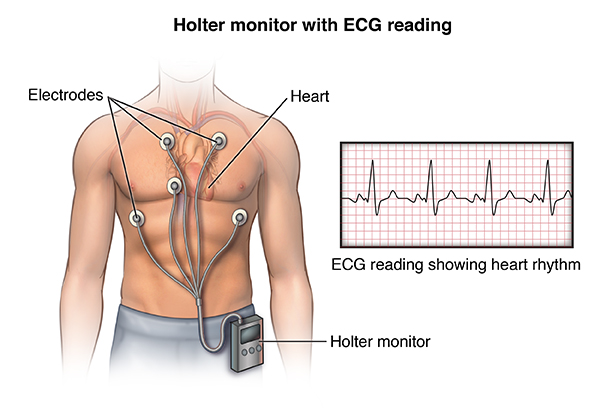
Holter Analysis. ABP Monitor.
ADVANCE TEST CENTER (ATC)
Advance Test Center (ATC)

ATC offers specialized diagnostic services, including ABP (Ambulatory Blood Pressure) Mentoring and Holter Analysis. Through ABP Mentoring, patients receive personalized guidance to better understand and manage their blood pressure over a 24-72 hour period. The Holter Analysis service involves continuous ECG monitoring to detect irregular heart rhythms, providing valuable insights into cardiovascular health. These services are designed to support accurate diagnosis and effective treatment planning in a comfortable and professional environment.
Services Provided in ATC
- ABP Monitor
- Holter Analysis
- Variceal Band Ligater
- Home Service
A Holter monitor (24-48 hour) is a small, wearable device that continuously records your heart’s electrical activity (ECG) for 24-48 hours or more. It's used to detect irregular heart rhythms, palpitations, or silent heart issues that a regular ECG might miss. Patients wear it during normal daily activities, and the recorded data helps doctors analyze heart function over time.
Services
Featured Srvices

ABP Monitor
ABP (Ambulatory Blood Pressure) Monitoring is a method of measuring blood pressure continuously over 24-72 hours while a person goes about their normal activities.

Holter Analysis
A Holter monitor is a portable device that continuously records your heart's electrical activity for 24-48 hours or more to detect irregular heart rhythms.

Variceal Band Ligator
A Variceal Band Ligator is a device used during endoscopy to place rubber bands around esophageal varices to prevent or stop bleeding.
What is 24- 72 Hour Ambulatory Blood Pressure Monitoring?
24-hour Ambulatory Blood Pressure Monitoring (ABPM) involves your blood pressure being measured at regular time intervals over 24 hours as you move around, going about your normal daily activities. It uses a small digital blood pressure machine that is attached to a belt around your body and connected to a cuff around your upper arm. It is small enough that you can go about your normal daily life and even sleep with.
What are the benefits of the 24-72 hour ABPM?
Blood pressure measurements by the doctor conventionally only take place when you are in the clinic. These readings may not reflect your usual blood pressure as the act of having one's blood pressure taken may cause stress to you, resulting in a falsely-elevated reading ('white-coat' hypertension). The infrequency of such clinic measurements may not give sufficient information on your blood pressure profile, especially if it has been difficult to control with medication. Home blood pressure monitoring while often useful, is also limited by how frequently you monitor it, the accuracy of home BP machines and user error.
24-hour ABPM overcomes these difficulties. By measuring your blood pressure at regular intervals over 24 hours, our doctor will be able to get a clear picture of how your blood pressure changes throughout the day.
The unique data provided by 24-hour ABPM includes:
- 24-72 hour average blood pressure (BP)
- Daytime (awake) average BP
- Night-time (asleep) average BP
- Blood pressure load - defined as the percentage of ambulatory systolic and diastolic BP exceeding 140 mmHg and 90 mmHg respectively during the daytime, and 120 mmHg and 80 mmHg respectively during sleep. This is a strong determinant of your cardiovascular risk
- Noctural BP dipping - defined as a BP drop of at least 15% of the daytime values during sleep. Failure of BP to dip at night is a risk factor for the development of heart failure and other cardiovascular complications

What is a Holter monitor?
A Holter monitor is a type of portable electrocardiogram (ECG). It records the electrical activity of the heart over 24-48 hours or longer while you are away from your healthcare provider's office.
A standard or resting ECG is one of the simplest and fastest tests used to check the heart. Small, plastic patches (electrodes) are put on certain points on the chest and belly (abdomen). The electrodes are connected to an ECG machine by wires. The electrical activity of the heart can be measured, recorded, and printed. No electricity is sent into the body.
Natural electrical impulses help control the different parts of the heart. This keeps blood flowing the way it should. An ECG records these impulses to show how fast the heart is beating. It also checks the rhythm of the heartbeats (steady or irregular). It records the strength and timing of the electrical impulses. Changes in an ECG can be a sign of many heart-related conditions.
Your healthcare provider may request a Holter monitor ECG if you have symptoms such as dizziness, fainting, and low blood pressure. They may also request a Holter monitor if you have ongoing tiredness, palpitations, or a resting ECG doesn’t show a clear cause. A Holter monitor may also be ordered if your resting ECG shows a problem but more information is needed. You wear the same kind of ECG electrode patches on your chest and the electrodes are connected by wires to a small monitor box (portable recording device). Newer devices don't use electrode patches and wires. They are a single unit that attaches to the chest like a patch.
Certain abnormal heart rhythms may happen only now and then. Or they may happen only under certain conditions, such as stress or activity. These are hard to record on an ECG done in the office. Because of this, the healthcare provider might request a Holter monitor to get a better chance of catching any abnormal heartbeats or rhythms that may be causing the symptoms. Some Holter monitors also have an event monitor feature that you activate when you notice symptoms. Holter monitors record
You will get instructions on how long you will need to wear the monitor (usually 24 to 48 hours but sometimes longer). Your provider will also tell you how to keep a diary of your activities and symptoms during the test, and about any personal care and activity instructions. For instance, you will need to keep the device dry while you are wearing it if wires are used.

Description
The SmartBand ligation kit is an endoscopic ligating device that is used to ligate esophageal varices at or above the gastroesophageal junction and to ligate internal hemorrhoids. This band ligating device may be used to treat acute bleeding from esophageal varices or for the prophylactic treatment of esophageal varices.
Omnis fugiat ea explicabo sunt dolorum asperiores sequi inventore rerum
Ullamco laboris nisi ut aliquip ex ea commodo consequat. Duis aute irure dolor in reprehenderit in voluptate velit esse cillum dolore eu fugiat nulla pariatur. Excepteur sint occaecat cupidatat non proident, sunt in culpa qui officia deserunt mollit anim id est laborum
Lorem ipsum dolor sit amet, consectetur adipiscing elit, sed do eiusmod tempor incididunt ut labore et dolore magna aliqua.
- Ullamco laboris nisi ut aliquip ex ea commodo consequat.
- Duis aute irure dolor in reprehenderit in voluptate velit.
- Ullamco laboris nisi ut aliquip ex ea commodo consequat. Duis aute irure dolor in reprehenderit in voluptate trideta storacalaperda mastiro dolore eu fugiat nulla pariatur.

Contact
Address
Near Out Side of President House Gate No. 2, Maharajgunj
Call Us
9841251195, 9803822957
Email Us
shivky36@gmail.com
